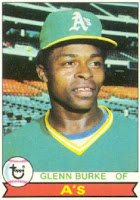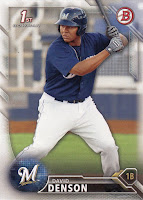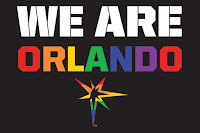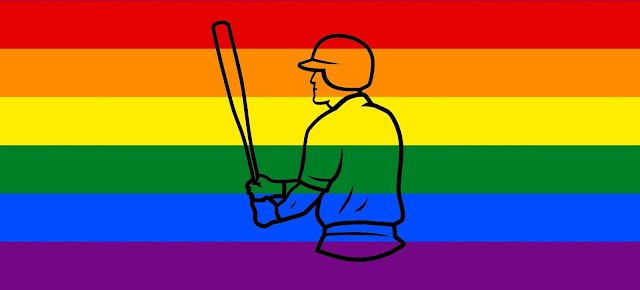Glenn Burke was an outfielder for the Dodgers and A's in the late 1970s. Although he never publicly came out during his career, most of his teammates were aware of his sexual orientation. Well-liked by the players, but seen as a public image problem by Dodger management, he was traded to Oakland for arguably a less talented player (the motive of the trade is still debated). With the A's, Burke was subjected to derogatory treatment and hateful speech, pushing him out of the league for good. Years later, he confided "I finally got to the point where it was more important to be myself than a baseball player." 35 years after Burke's retirement, in 2014, pitching prospect Tyler Dunnington played one season in the minors, where he was not comfortable coming out to his teammates. He endured hearing homophobic language in the locker room, including the condoning of violence towards LGBT individuals. At the end of the year he walked away from the game he loved, later saying "I felt I had to choose between being an out gay man or playing baseball."
 During that time frame, most of the progress with the LGBT community was made on a team-by-team basis. In the mid-1990s, for example, as Glenn Burke's body was losing a hard-fought battle against HIV/AIDS, the Oakland A's - a team that had largely ostracized him 15 years prior - established a fund to help their former player pay for his meals (Burke passed away in 1995). In 2001, the Chicago Cubs organized what is believed to be the first Pride Night in Major League Baseball. Over a decade later, in 2013, the Yogi Berra Museum and Learning Center in Little Falls, New Jersey, formed a partnership with non-profit organization Athlete Ally that resulted in an exhibit and educational series on inclusiveness in sports. From 2011 through 2013 the MLB front office did lightly address the issue by making the language of their non-discrimination policy more inclusive and establishing a centralized system of filing harassment complaints, but neither of these actions did much, if anything, to change the attitudes or behavior of players and coaches.
During that time frame, most of the progress with the LGBT community was made on a team-by-team basis. In the mid-1990s, for example, as Glenn Burke's body was losing a hard-fought battle against HIV/AIDS, the Oakland A's - a team that had largely ostracized him 15 years prior - established a fund to help their former player pay for his meals (Burke passed away in 1995). In 2001, the Chicago Cubs organized what is believed to be the first Pride Night in Major League Baseball. Over a decade later, in 2013, the Yogi Berra Museum and Learning Center in Little Falls, New Jersey, formed a partnership with non-profit organization Athlete Ally that resulted in an exhibit and educational series on inclusiveness in sports. From 2011 through 2013 the MLB front office did lightly address the issue by making the language of their non-discrimination policy more inclusive and establishing a centralized system of filing harassment complaints, but neither of these actions did much, if anything, to change the attitudes or behavior of players and coaches.
It wasn't until 2014 that MLB started to get to more pro-active in addressing the issue. On July 15, the commissioner appointed former player Billy Bean as baseball's first Ambassador of Inclusion (not to be confused with Billy Beane who was portrayed by Brad Pritt in the movie Money Ball). In this role, Bean provides guidance and leads initiatives to improve MLB's relations with the LGBT community. He also develops training initiatives, for players and coaches, to counter sexism, homophobia, and prejudice at all levels of professional baseball. Bean played in the major and minor leagues from 1986 until 1995. In 1999, he became the first former player since Glenn Burke to come out publicly. In a 2015 interview with NPR, he explained his breaking point:
 Two months later, David Denson, a minor league player in the Milwaukee Brewers' organization, decided to be open with his teammates about his sexual orientation. Instead of the condemnation he feared, Denson's announcement was met with support and comradery. The team's positive response encouraged him to come out publicly with an article in the Milwaukee Journal Sentinel, making him the first active player on a MLB-affiliated team to do so. The following December, at MLB's winter meetings, Denson was praised by the president of Minor League Baseball in his opening remarks.
Two months later, David Denson, a minor league player in the Milwaukee Brewers' organization, decided to be open with his teammates about his sexual orientation. Instead of the condemnation he feared, Denson's announcement was met with support and comradery. The team's positive response encouraged him to come out publicly with an article in the Milwaukee Journal Sentinel, making him the first active player on a MLB-affiliated team to do so. The following December, at MLB's winter meetings, Denson was praised by the president of Minor League Baseball in his opening remarks.
MLB kept the ball rolling in 2016. On March 7 (one day before opening their Summit on Diversity in Business), the league announced a new partnership with the National Gay and Lesbian Chamber of Commerce (NGLCC). Under the agreement, NGLCC will help MLB add more certified LGBT-owned and operated businesses to their list of suppliers.
 More recently, on June 17, the Tampa Bay Rays switched the focus of their already-planned "Pride Night" to honor the victims of a mass shooting at the Pulse gay nightclub in Orlando a few days earlier. In the days leading up to the game, the Rays lowered the price of all available tickets to $5 and donated 100% of the proceeds to the Pulse Victims Fund. After the announcement, over 20,000 additional tickets were sold, making it one of the highest selling games in team history (with over 40,000 people in attendance). Combined with other fund-raising efforts, a total of $300,000 was collected for the victims and their families. All fans and players were given T-shirts that said "We Are Orlando" and a minute of silence was observed while the names and photos of those who had perished were displayed on the big screen.
More recently, on June 17, the Tampa Bay Rays switched the focus of their already-planned "Pride Night" to honor the victims of a mass shooting at the Pulse gay nightclub in Orlando a few days earlier. In the days leading up to the game, the Rays lowered the price of all available tickets to $5 and donated 100% of the proceeds to the Pulse Victims Fund. After the announcement, over 20,000 additional tickets were sold, making it one of the highest selling games in team history (with over 40,000 people in attendance). Combined with other fund-raising efforts, a total of $300,000 was collected for the victims and their families. All fans and players were given T-shirts that said "We Are Orlando" and a minute of silence was observed while the names and photos of those who had perished were displayed on the big screen.
Earlier that week, the MLB front office chose to respond by asking all stadiums to lower their flags to half-staff. The reason was to honor the victims of the shooting, but in doing so, they also honored the memory of Glenn Burke, of Billy Bean's deceased partner Sam, and the tribulations of countless players, coaches, fans and umpires who felt compelled to stay in the shadows, unable to express themselves freely.
Sources:
-"A Boy of Summer's Long Chilly Winter: Glenn Burke is Dying of AIDS", Jennifer Frey, The New York Times, October 18, 1994
-"Major League Baseball Adds 'Sexual Orientation' to Player's Anti-Discrimination Clause", The Huffington Post, February 2, 2011
"MLB Announces a New Code of Conduct Strengthening Protections Against Discrimination Based on Sexual Orientation", MLB.com, July 16, 2013
-"A Chat with Dave Pallone, First MLB Umpire to Come Out as Gay", Rob Neyer, Fox Sports, December, 2014
-"Yogi and Athlete Ally Team Up for LGBT Equality", Alyson Footer, MLB.com, July 13, 2014
-"Major League Baseball Tries to be More Welcoming to the LGBT Community" (interview), David Greene and Billy Bean, National Public Radio, April 9, 2015
-"Brewers Minor Leaguer Makes History By Coming Out Publicly as Gay", Tom Haudricourt, Milwaukee Journal Setinal, August 15, 2015
-"The Trials of Baseball's First Openly Gay Player, Glen Burke", Sarah Kaplan, The Washington Post, August 17, 2015
-"MLB's 'Gay Night Out' Goes Mainstream", Lou Chibbaro Jr, Washington Blade, August 19, 2015
-"MLB is Announcing a Huge Partnership with LGBT-Owned Businesses", Benjamin Snyder, FORTUNE, March 7, 2016
-"Gay Cardinals Minor League Player Quite Baseball When Teammates Said Gays Should Be Killed", Cyd Zeigler, OutSports, March 16, 2016
-"Glen Burke's Potential Still Haunts Mike Norris", Owen Nelson, HardBallTimes.com, June 10, 2016
-"Ray's Fans Come Together to Sell Out Pride Night Game Honoring Orlando", Anastasia Dawson, Tampa Bay Times, June 17, 2016
"I was starting my third year with the San Diego Padres, and my partner, Sam, we came to find out that he was HIV positive. He became extremely ill and he died about two months after we found out. He died the night before the season started in 1995. And I realized, as I was about to leave the hospital at 7 am, that there wasn't one person in the world I could tell that my partner had just died. I had a game at 1 pm that day. I just went home, showered up and went to the ball park and played. When the season ended, I just sort of collapsed emotionally. I was lonely."In the two years since Bean was appointed, there have been some tangible results throughout the league. Dale Scott became the first openly gay umpire when he married his partner of 28 years in 2014. In an interview published shortly afterwards, Dave Pallone, an umpire in the 1980s who was fired after rumors of his sexual orientation began to surface, theorized that Scott's openness would help closeted players feel more comfortable about their own sexuality. Pallone also alluded to the role of, and impact on, the fans; "Until now, when people watched a baseball game, they just assumed that every single person on the field had the same orientation. Straight. But [now] that will change." It wasn't long afterwards, in June of 2015, that Sean Conroy, a pitcher in an independent league (not affiliated with the MLB), made history by becoming the first active professional baseball player to publicly announce he was gay.
 Two months later, David Denson, a minor league player in the Milwaukee Brewers' organization, decided to be open with his teammates about his sexual orientation. Instead of the condemnation he feared, Denson's announcement was met with support and comradery. The team's positive response encouraged him to come out publicly with an article in the Milwaukee Journal Sentinel, making him the first active player on a MLB-affiliated team to do so. The following December, at MLB's winter meetings, Denson was praised by the president of Minor League Baseball in his opening remarks.
Two months later, David Denson, a minor league player in the Milwaukee Brewers' organization, decided to be open with his teammates about his sexual orientation. Instead of the condemnation he feared, Denson's announcement was met with support and comradery. The team's positive response encouraged him to come out publicly with an article in the Milwaukee Journal Sentinel, making him the first active player on a MLB-affiliated team to do so. The following December, at MLB's winter meetings, Denson was praised by the president of Minor League Baseball in his opening remarks.MLB kept the ball rolling in 2016. On March 7 (one day before opening their Summit on Diversity in Business), the league announced a new partnership with the National Gay and Lesbian Chamber of Commerce (NGLCC). Under the agreement, NGLCC will help MLB add more certified LGBT-owned and operated businesses to their list of suppliers.
 More recently, on June 17, the Tampa Bay Rays switched the focus of their already-planned "Pride Night" to honor the victims of a mass shooting at the Pulse gay nightclub in Orlando a few days earlier. In the days leading up to the game, the Rays lowered the price of all available tickets to $5 and donated 100% of the proceeds to the Pulse Victims Fund. After the announcement, over 20,000 additional tickets were sold, making it one of the highest selling games in team history (with over 40,000 people in attendance). Combined with other fund-raising efforts, a total of $300,000 was collected for the victims and their families. All fans and players were given T-shirts that said "We Are Orlando" and a minute of silence was observed while the names and photos of those who had perished were displayed on the big screen.
More recently, on June 17, the Tampa Bay Rays switched the focus of their already-planned "Pride Night" to honor the victims of a mass shooting at the Pulse gay nightclub in Orlando a few days earlier. In the days leading up to the game, the Rays lowered the price of all available tickets to $5 and donated 100% of the proceeds to the Pulse Victims Fund. After the announcement, over 20,000 additional tickets were sold, making it one of the highest selling games in team history (with over 40,000 people in attendance). Combined with other fund-raising efforts, a total of $300,000 was collected for the victims and their families. All fans and players were given T-shirts that said "We Are Orlando" and a minute of silence was observed while the names and photos of those who had perished were displayed on the big screen. Earlier that week, the MLB front office chose to respond by asking all stadiums to lower their flags to half-staff. The reason was to honor the victims of the shooting, but in doing so, they also honored the memory of Glenn Burke, of Billy Bean's deceased partner Sam, and the tribulations of countless players, coaches, fans and umpires who felt compelled to stay in the shadows, unable to express themselves freely.
Sources:
-"A Boy of Summer's Long Chilly Winter: Glenn Burke is Dying of AIDS", Jennifer Frey, The New York Times, October 18, 1994
-"Major League Baseball Adds 'Sexual Orientation' to Player's Anti-Discrimination Clause", The Huffington Post, February 2, 2011
"MLB Announces a New Code of Conduct Strengthening Protections Against Discrimination Based on Sexual Orientation", MLB.com, July 16, 2013
-"A Chat with Dave Pallone, First MLB Umpire to Come Out as Gay", Rob Neyer, Fox Sports, December, 2014
-"Yogi and Athlete Ally Team Up for LGBT Equality", Alyson Footer, MLB.com, July 13, 2014
-"Major League Baseball Tries to be More Welcoming to the LGBT Community" (interview), David Greene and Billy Bean, National Public Radio, April 9, 2015
-"Brewers Minor Leaguer Makes History By Coming Out Publicly as Gay", Tom Haudricourt, Milwaukee Journal Setinal, August 15, 2015
-"The Trials of Baseball's First Openly Gay Player, Glen Burke", Sarah Kaplan, The Washington Post, August 17, 2015
-"MLB's 'Gay Night Out' Goes Mainstream", Lou Chibbaro Jr, Washington Blade, August 19, 2015
-"MLB is Announcing a Huge Partnership with LGBT-Owned Businesses", Benjamin Snyder, FORTUNE, March 7, 2016
-"Gay Cardinals Minor League Player Quite Baseball When Teammates Said Gays Should Be Killed", Cyd Zeigler, OutSports, March 16, 2016
-"Glen Burke's Potential Still Haunts Mike Norris", Owen Nelson, HardBallTimes.com, June 10, 2016
-"Ray's Fans Come Together to Sell Out Pride Night Game Honoring Orlando", Anastasia Dawson, Tampa Bay Times, June 17, 2016

